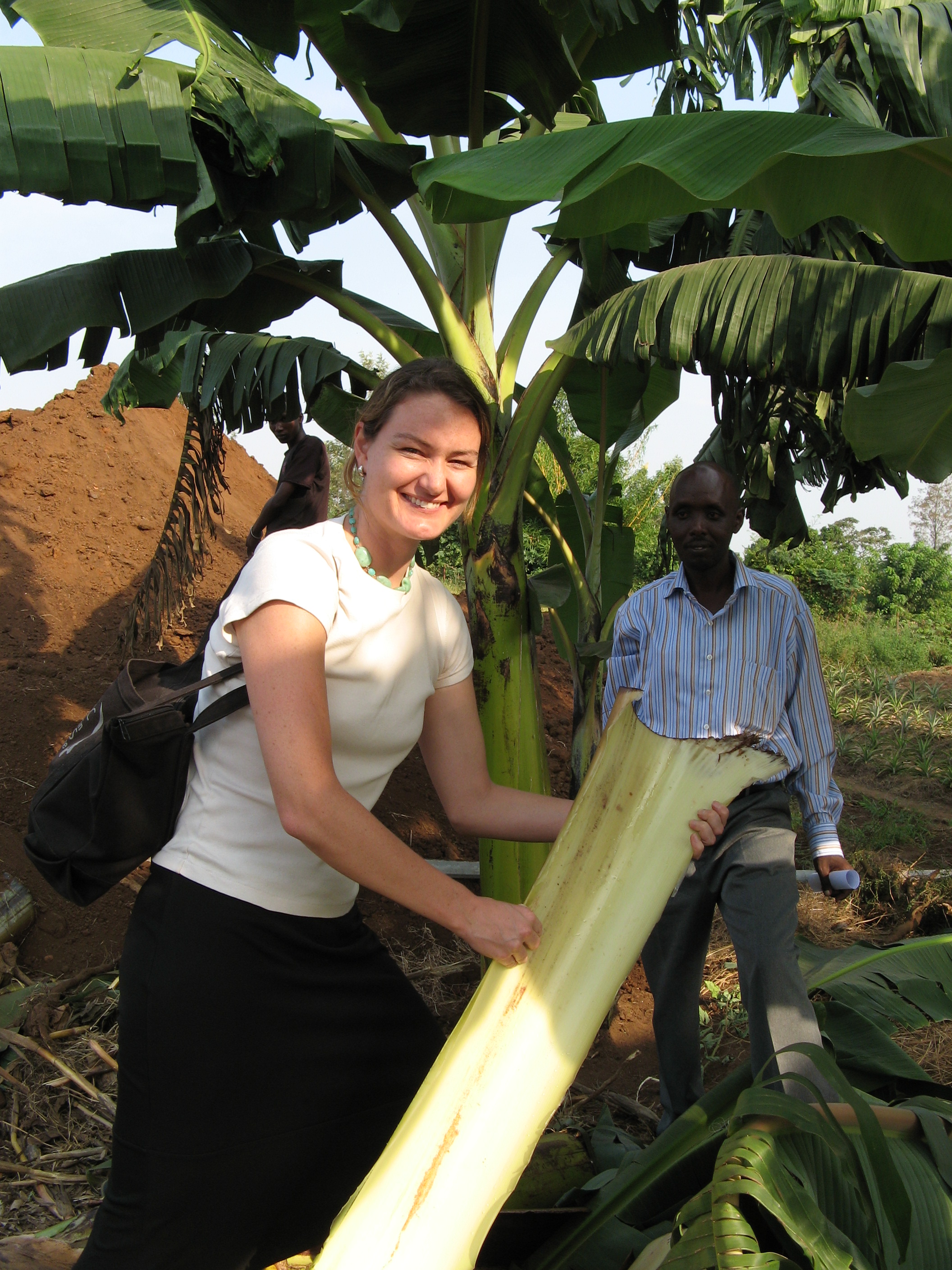Harvard Business School Selects Inaugural Recipient of Social Entrepreneurship Fellowship
 Elizabeth and her team in Rwanda
Elizabeth and her team in Rwandaseeking more cost-effective local raw materials to lower the price of expensive, imported sanitary pads. Photo: Hannah Brice BOSTON — Elizabeth Scharpf (MBA 2007) has been named the first Harvard Business School Social Entrepreneurship Fellow for her work in launching Sustainable Health Enterprises (SHE). SHE is a platform for starting businesses that use innovative, market-based approaches to tackle socio-economic and public health problems in developing countries. Scharpf started SHE in late 2007 based on the belief that charitable efforts alone are not enough to address the breadth and complexity of socio-economic and health problems that exist in developing countries. The HBS Social Entrepreneurship Fellowship program is designed to support the efforts of recent HBS graduates who are launching social enterprises - nonprofit, for-profit, or hybrid organizations - with a central focus on the creation of social value. This pilot program provides seed funding support to one recent graduate each year through a $25,000 fellowship. The first SHE venture addresses the widespread phenomenon of girls and women missing school or work when they are menstruating because they lack access to affordable sanitary pads. Currently working in Rwanda, SHE is developing a sanitary pad sourced from local materials to be sold for 30 percent less than currently available brands. Local Rwandan women will manufacture and market these pads and gradually become owners of the business through microfinance loans. "In interviews with more than 500 women and girls in Rwanda, we found that half of the girls interviewed are missing school due to menstruation, primarily because sanitary pads are too expensive," said Scharpf. "Lack of access to pads affects not only the prospects of girls and women, it also has significant macro-economic consequences for countries - in fact, we estimate a $115 million loss in GDP per year in Rwanda alone. "SHE expects that this rate is comparable in other resource-poor countries and we plan to undertake similar efforts in those countries," Scharpf continued. "It is an honor to be Harvard Business School's first Social Entrepreneurship Fellow. These resources will help SHE succeed during this critical phase of our pilot roll-out." The Social Entrepreneurship Fellowship is designed to fit within the array of already established programs that support HBS students in pursuit of new social ventures - a career path that is increasingly being explored by recent graduates. As an example, since the founding of the Social Enterprise Track of the HBS Business Plan Contest in 2001, nearly one-third of the contest entrants have gone on to pursue some form of implementation of their plan and several have done so through the pursuit of stand-alone social ventures immediately or soon after graduation. "The Harvard MBA curriculum provides students with a variety of learning opportunities that prepare them for future roles in social enterprise. Beyond second-year electives, students also have options to develop a business plan for a social venture - such as taking part in a faculty-supervised field-based learning project, entering the Social Enterprise Track of the annual HBS Business Plan Contest, or participating in the Social Enterprise Summer Fellowship program," said HBS Professor William Sahlman, one of the faculty co-chairs of the new program. "And now, with the Social Entrepreneurship Fellowship, HBS can continue to provide support to entrepreneurial MBAs post graduation in their pursuit of their social ventures." The HBS Social Entrepreneurship Fellow is selected annually through a competitive process. Fellowship applicants must submit an application along with a business plan that focuses on creating social value. The business plans are judged on their likelihood of success, social value creation, resources, and performance measurement. During the year of their Fellowship, award winner must dedicate the majority of their time to the launch of their new venture. To be considered for the next fellowship, candidates must submit a complete application, resume, and business plan by June 15. Going forward, announcement of the Fellowship will be made by the end of August each year. About Elizabeth Scharpf About the HBS Social Enterprise Initiative |
About Harvard Business School
Harvard Business School, located on a 40-acre campus in Boston, was founded in 1908 as part of Harvard University. It is among the world's most trusted sources of management education and thought leadership. For more than a century, the School's faculty has combined a passion for teaching with rigorous research conducted alongside practitioners at world-leading organizations to educate leaders who make a difference in the world. Through a dynamic ecosystem of research, learning, and entrepreneurship that includes MBA, Doctoral, Executive Education, and Online programs, as well as numerous initiatives, centers, institutes, and labs, Harvard Business School fosters bold new ideas and collaborative learning networks that shape the future of business.
